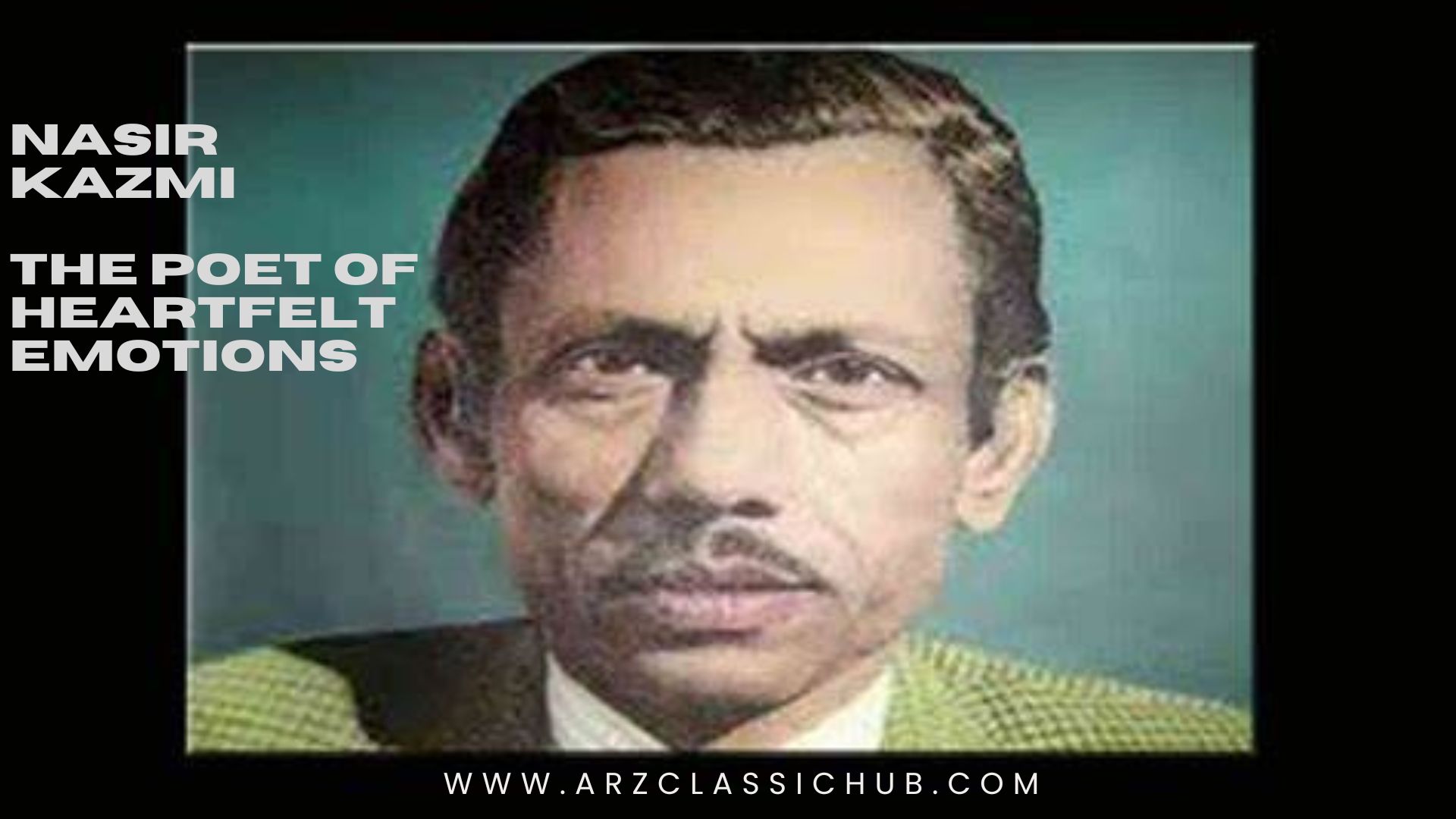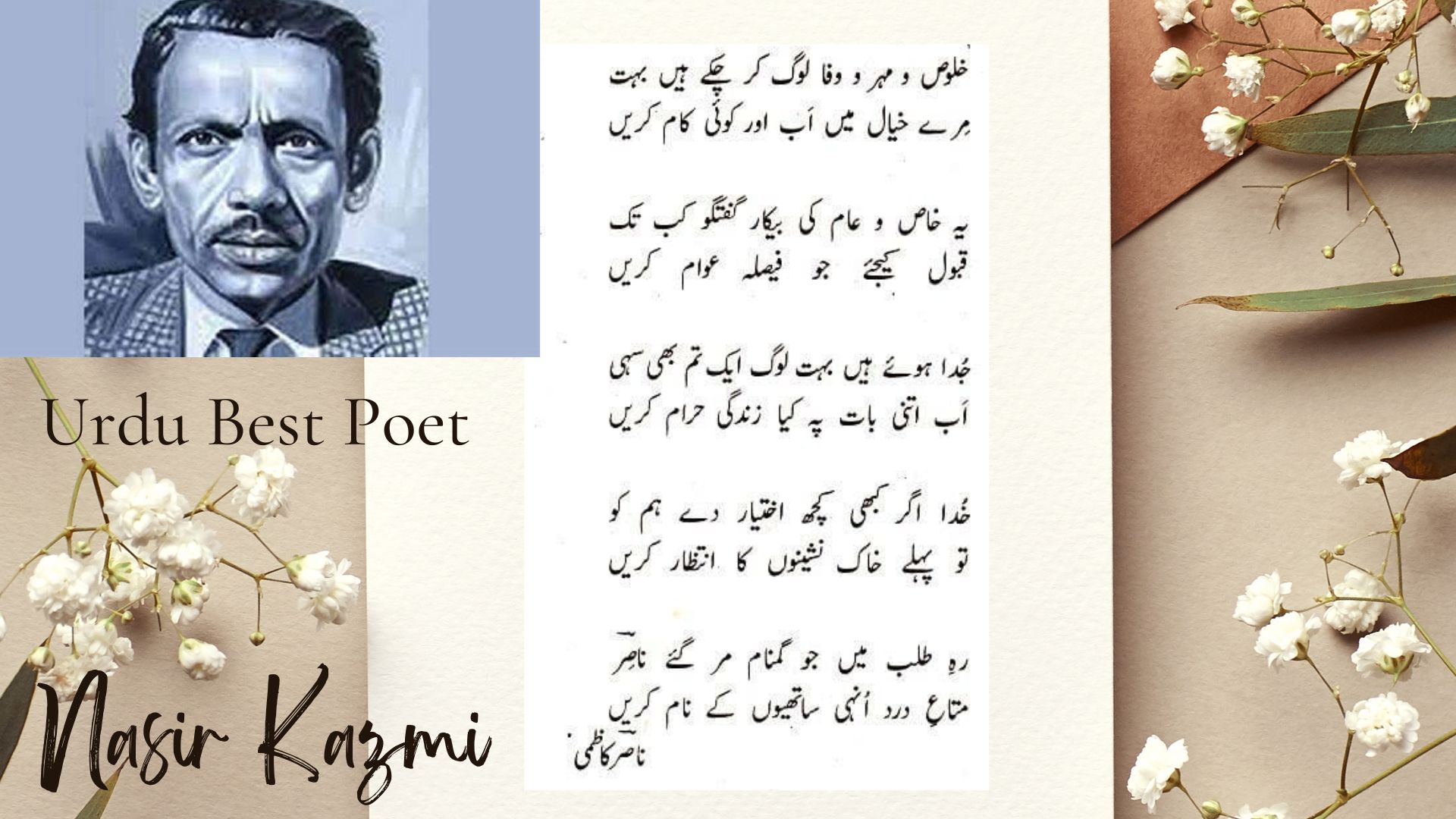Nasir Kazmi Poetry
Nasir Kazmi: The Poet of Heartfelt Emotions
Nasir Kazmi, a name that echoes through the corridors of modern Urdu poetry, remains one of the most revered poets of the 20th century. His verses, steeped in melancholy and beauty, have touched the hearts of millions across the world. Kazmi’s poetry reflects the emotional depth and the turbulent times of his era, making him not just a poet but a symbol of the human condition.Early Life and Education
Nasir Kazmi was born on December 8, 1925, in the city of Ambala, which was part of British India at the time, but became part of Pakistan after the partition in 1947. His family migrated to Pakistan after the partition, and he spent most of his life in Lahore. Kazmi was deeply influenced by the cultural and intellectual atmosphere of the city, which later became the backdrop for much of his poetry. Kazmi was initially drawn to literature and poetry during his childhood. He pursued his education in various institutions, including Government College Lahore, where he received a degree in English Literature. His academic background in literature, combined with his personal experiences, laid the foundation for his poetic journey.The Journey of a Poet
Nasir Kazmi’s poetic career began in his youth. He initially started writing poetry in the classical style but later embraced modern Urdu poetry. His early work reflected the struggles of a nation in turmoil, struggling with the aftermath of partition and the challenges of independence. He was profoundly influenced by poets like Allama Iqbal, Faiz Ahmed Faiz, and Ahmed Faraz, yet he developed a unique voice of his own, characterized by simplicity and deep emotional resonance. Kazmi’s poetry is known for its lyricism, nostalgia, and a sense of longing. He often wrote about themes of love, separation, loneliness, and the passage of time. His poems reflect an individual’s inner turmoil and their quest for solace in a world that often seems indifferent to their pain.Kazmi’s Unique Style
Nasir Kazmi’s poetic style was distinct for its simplicity and emotional depth. Unlike some of his contemporaries who used complex metaphors and intricate wordplay, Kazmi’s language was clear, direct, and deeply personal. His poems often convey the universal themes of love and loss in a way that resonates with readers on an intimate level. One of the hallmarks of Kazmi’s work is his use of melancholic imagery. His verses evoke images of solitude, deserted streets, and a yearning for the past. His poetry is deeply introspective, with a reflective quality that touches on existential themes. At the same time, his work also resonates with beauty and grace, often using nature as a metaphor for emotional experiences.Major Works
Nasir Kazmi’s poetry collections are a testament to his enduring legacy. Some of his most notable works include:- “Darmiyan” (Between): This is one of his most popular collections, filled with poems of love, separation, and longing. The poetry in “Darmiyan” captures the essence of emotional distance and the pain that accompanies unfulfilled desires.
- “Sitaron Se Aage” (Beyond the Stars): Another of his significant works, this collection is marked by its reflection on the human condition, particularly the sense of disillusionment and a yearning for something greater than earthly existence.
- “Aaj Bhi” (Even Today): This collection features Kazmi’s later works and reveals his ever-deepening reflection on time, memory, and the impermanence of life.
Themes in Kazmi’s Poetry
Nasir Kazmi’s poetry is defined by several recurring themes, most notably:- Melancholy and Longing: Kazmi’s poetry often conveys a sense of sorrow, loss, and nostalgia. His works reflect a longing for the past, an unrequited love, or the emotional distance between people.
- Separation: Many of Kazmi’s poems explore the pain of separation, whether physical or emotional. He expressed the heartache of being apart from loved ones, a theme that resonated with the post-partition generation.
- Time and Memory: Time plays a critical role in Kazmi’s poetry. He often explores how memories fade, how moments pass, and how individuals grapple with the inevitable passage of time.
- Existential Reflection: Kazmi’s poems delve into deeper philosophical questions about life, existence, and the nature of human suffering. He addresses the transient nature of life and the quest for meaning in an unpredictable world.


